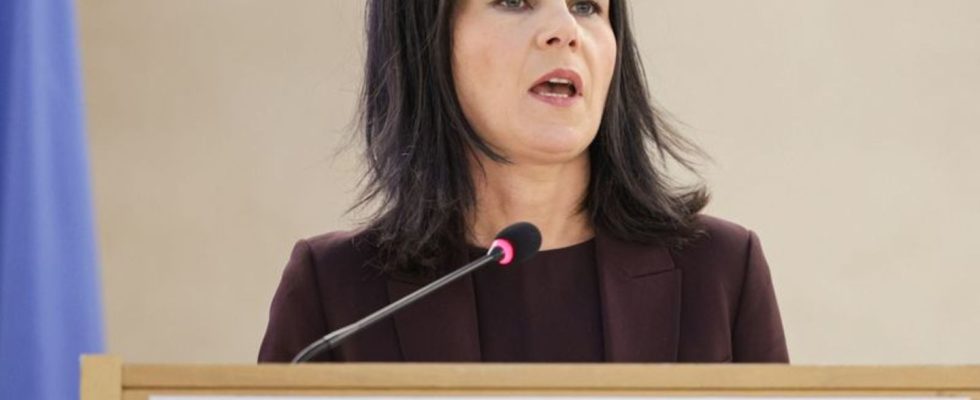Human Rights Council meets in Geneva
Baerbock for extending the UN investigation into Iran
“Human rights are not something western, northern, eastern or southern. They are universal”: Federal Foreign Minister Annalena Baerbock. photo
© Hannes P. Albert/dpa
Gaza Strip, Ukraine, Sudan: just a few of the many conflicts that are currently throwing the world out of balance are raging there. Foreign Minister Baerbock also addresses another country.
“Like every other country in the world, Israel has the right to defend itself. Like every other country in the world, it must do so within the framework of international humanitarian law and human rights,” said the Green politician at the spring session of the UN Human Rights Council in Geneva . Germany is working continuously for a humanitarian ceasefire.
Baerbock: Human rights are universal
At the same time, Baerbock urged the extension of the UN Human Rights Council’s mandate to investigate events in Iran following the violent suppression of protests in the country. Addressing the government in Tehran, she emphasized that she wanted to say clearly to those who claimed that highlighting violations amounted to interference in internal affairs: “Human rights are not something Western, Northern, Eastern or Southern. They are universal. They are not limited to cardinal directions. They are indivisible.”
The investigative mission is about collecting and storing evidence, said Baerbock. This should give “the victims a voice”. The Federal Government is therefore asking for support in extending the mandate so that the mission can fulfill its task. This is the purpose of the UN Human Rights Council: “For the international community to show that a life is a life.”
Tehran does not want any interference
Germany enforced an investigation in November 2022 after the suppression of anti-government protests in Tehran. A group of experts is due to present its report in the coming days, which is expected to be debated on March 15th. Iran refused to cooperate with the appointed experts.
Iran’s Foreign Minister Hussein Amirabdollahian spoke to Baerbock. He made the situation in the Gaza Strip his central issue and accused Israel and its allies of genocide against the Palestinians in the Gaza Strip. We need to look there instead of appointing a group of experts for Iran to collect facts on the human rights situation. This is an “instrumentalization of human rights for political purposes,” he said. He described Amini’s death as tragic. However, Iran has all the necessary resources to investigate the incident internally.
“Seismic global shocks”
At the beginning of the spring session of the UN Human Rights Council, the UN High Commissioner for Human Rights, Volker Türk, spoke of “seismic global shocks” due to numerous wars, conflicts and tensions. “The pain and slaughter of so many people in the Middle East, Ukraine, Sudan, Myanmar, Haiti and so many other places around the world is unbearable,” Turk said. He used the word “slaughter” in his speech, which was given in English.
Türk continued: “Within countries, the ‘us versus them’ ideology is leading to increasingly dangerous and explosive divisions, especially in pre-election times, of which there are many this year. (…) Seeing the humanity in others is the lifeline that can pull us out of disaster.”
UN Secretary-General António Guterres spoke of a dangerous drifting apart of the world into rival power blocs. He called on the global community to come together instead of giving room to hatred and trampling on human rights. Difficult times also presented opportunities to show leadership and give justice a central place on the international stage. International humanitarian law, which applies worldwide and sets guidelines for behavior in conflicts and protects civilians, must be respected again. It was created from a clear realization: “Terrorizing a civilian population (…) is a recipe for endless anger, alienation, extremism and conflict.”
The situation in Gaza does not make the situation in the UN Human Rights Council any easier
The constellation in the Human Rights Council with 47 rotating member countries is difficult from the perspective of Western countries. For many, the situation in the Gaza Strip is the overriding issue. Some accuse Western states of using different standards: for example, they denounced oppression by the leadership of the Islamic Republic in Iran, but did not take sufficient account of human rights violations against the Muslim population of the Gaza Strip. Western countries reject this. In his opening speech, Guterres emphasized that there should be no double standards.
The 47 countries are elected to the UN Human Rights Council by the UN General Assembly for three years each. Germany is currently there. All countries can be brought up and speak there, but only the members can vote on resolutions. This happens towards the end of the session, which lasts until April 5th.

